Richard Henry Pratt responds to the request to return Mary Ladouceur to her home at the request of her father.
Pratt, Richard Henry
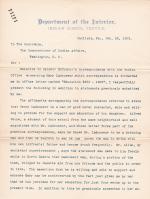

Colonel Richard H. Pratt submits a report that lists irregular employees who worked at the school during February 1903. The report includes details on compensation, position titles, race, and the number of days worked during that month.

Richard W. D. Bryan writes to Richard Henry Pratt, sending sympathies over news of Pratt's resignation as superintendent at Carlisle.
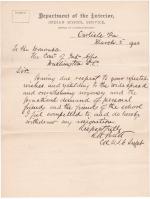
Richard Henry Pratt withdraws his resignation as Superintendent of the Carlisle Indian School.
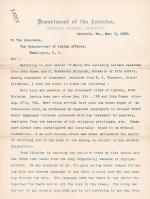
Edgar A. Allen responds to the complaints of John Susep and J. Frederick Nicholar against disciplinarian W. G. Thompson.
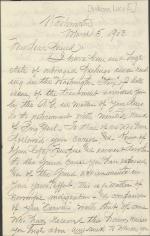
Lucy E. Anderson writes of her outrage over Richard Henry Pratt's treatment by politicians over his management of Carlisle, and offers her support. Anderson also inquires about whether Pratt could connect his son Mason Pratt with John A. Brightwell, a youth Anderson knows.
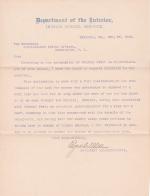
Edgar A. Allen requests to be promoted to the position of Superintendent of the Carlisle Indian School as a result of the resignation of Richard Henry Pratt.
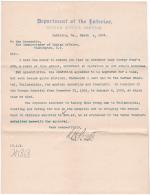
Richard Henry Pratt informs the Office of Indian Affairs of the death of George Bears Arm and requests authority to pay the vouchers associated with his treatment and bringing him back from Philadelphia.
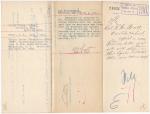
Richard Henry Pratt returns letter of A. C. Towner regarding a request by Lydie Doxtator for the return of her son. Pratt notes that no letter was enclosed and there is no record indicating who is Doxtator's son.
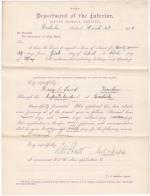
Richard Henry Pratt forwards Daisy C. Laird's application for a 27-day annual leave of absence. Laird works as a teacher.
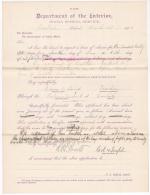
Richard Henry Pratt forwards teacher Daisy C. Laird's application for a 120-day leave of absence because of bad health. Laird will return when health improves.
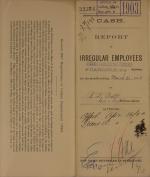
Colonel Richard H. Pratt submits a report that lists irregular employees who worked at the school during March 31, 1903. The report includes details on compensation, position titles, race, and the number of days worked during that month.
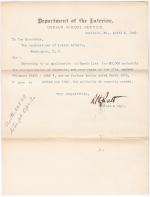
Richard Henry Pratt emphasizes to the Office of Indian Affairs the need to authorize spending an additional $3,000 to transport students to and from the Carlisle Indian School.
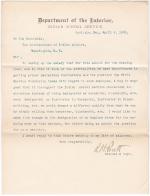
Richard Henry Pratt requests to change the industrial training staff positions to Instructor in Carpentry, Instructor in Blacksmithing, etc. from Carpenter and Blacksmith. Pratt notes that this change might produce a different applicant from the Civil Service Commission.
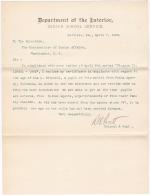
Richard Henry Pratt provides the Office of Indian Affairs with a certificate of the age of Ida Mitchell.
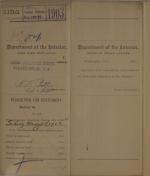
Richard H. Pratt requests a supply of two dozen different articles of stationery used by the United States Indian Affairs division of the Department of the Interior for the fiscal year ending June 30, 1904.
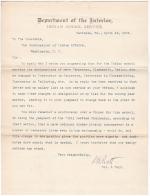
Richard H. Pratt submits his request for positions and salaries for the upcoming fiscal year, compared against the list of position for the current year. The list includes position titles, the number of employees for each position title, and salary. Pratt requests $52,050 for employee salaries in 1904, compared to $50,930 in 1903. Names of…
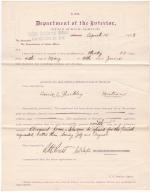
Richard Henry Pratt forwards Matron Carrie E. Weekley's application for a 30-day annual leave of absence.
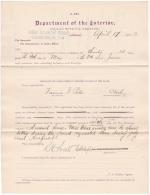
Richard Henry Pratt forwards Fannie I. Peter's request for a 30-day annual leave of absence. Peter works as a clerk.

Richard Henry Pratt informs W. A. Jones about two runaway students.
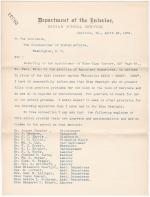
Richard Henry Pratt informs the Office of Indian Affairs that with the appointment of Olga Koerner that no provision for quarters or board are expected to be provided. Pratt also includes a list of employees who provide wither own quarters and accommodations.
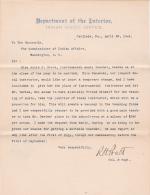
Richard Henry Pratt informs the Office of Indian Affairs that with Annie B. Moore leaving the Service at the close of year that Jeannette Senseney is moving to the instrumental instructor with William Davies becoming the vocal instructor. As a result, Pratt requests a male teacher to replace Davies.
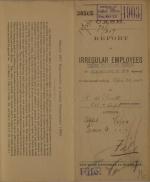
Colonel Richard H. Pratt submits a report that lists irregular employees who worked at the school during April 1903. The report includes details on compensation, position titles, race, and the number of days worked during that month.
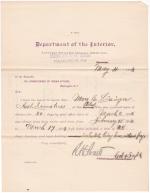
Richard Henry Pratt forwards a report on leave of absence for assistant seamstress Mary E. Lininger.
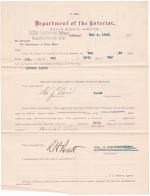
Richard Henry Pratt forwards Clerk S. J. Nori's application for a 10-day annual leave of absence.
